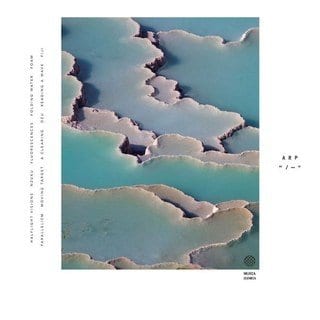
Arp is the project of one Alexis Georgopoulos, a producer who has countless collaborations and four albums under his belt previous to Zebra, his latest effort. He is an artist who knows his equipment, knows what he likes and who he likes to work with, knows about the business he is in and knows what sounds good to him.
To be sure, Zebra is impeccably produced, the result of an artist living with his art, refining it, and turning it into exactly what he wants it to be. Throughout Zebra, there is rarely any doubt that it exists exactly as Georgopoulos intended it.
That said, to an outside observer — or, at least, someone finding Arp for the first time — Zebra is a strangely sterile, emotionless experience. There are no flaws to be found, but few feelings to feel. Something like, say, “Nzuku” has all the elements of a fascinating piece of music: there’s a 6/4 beat, lots of scattered “skronk” and “blorp” sounds, and an excess of marimba. Altogether, however, it sounds like something you might hear while on hold with your insurance company, waiting to see if a dental procedure is covered under your plan. There’s nothing there. It’s daring you to notice it, wondering if you’ll care. “Parallelism” gets closer to something interesting, as the fast pace of the marimba (again) evokes Steve Reich’s more melodic work, but there’s very little done with that solid base. Some pianos are layered over the top, airy synths come and go, and an errant AM radio tries desperately to find something to hold on to.
Perhaps most disappointing is “Fluorescences”, which layers and re-arranges many elements of the synth arrangement to Tears for Fears’ “Everybody Wants to Rule the World”, an approach that could be an interesting reimagining of a beloved (or in some cases reviled) hit song. It is quite pleasant. There is no urgency, no story, no arc to it, and no reason to remember it five minutes after you have heard it, but it is pleasant.
Again, it’s hard to levy any of this criticism in an impactful way, as there is clearly a vibe that Georgopoulos was going for, which he unquestionably achieved. Somehow, the few quiet standouts don’t deviate from the mood, despite finding a way to be more interesting than their surroundings. “Folding Water” is hiding in plain sight, an unassuming bit of early-period Autechre/Orbital pap whose careful touch with the synths that phase their way in and out of the picture is actually pretty fascinating to listen to (though it’s hard to make a case for its 23-second epilogue, “Foam”, which merely isolates those synths for a bit before moving on). Late in the album, the near-nine-minute “Reading a Wave” is an excursion into quiet free-jazz that paints a picture of serenity amidst chaos, a particular delight in troubled times.
Aspiring for something peaceful is not in and of itself a wasted endeavor; rather, it seems particularly difficult to make peace sound interesting. While Arp’s Zebra occasionally finds a way to do so, it mostly highlights the danger in such a pursuit. There is a very fine line between contentment and the utter absence of feeling, and while Zebra‘s production and mix is flawless throughout, it falls too often on the wrong side of that line.

